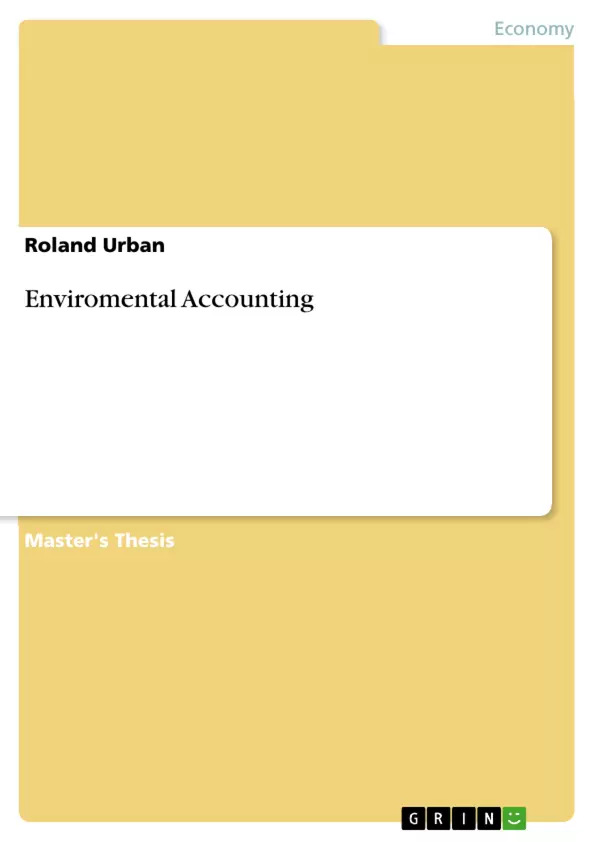The growth in environmental accounting research and interest in the last few decades has experienced an optimistic time. Business is not an isolated island apart from the earth any more; the emergency of environmental accounting came from outside stakeholder at the end of 20th century. Following with the rising sense of environment conservation no matter from the public or the companies/organizations, environmental accounting has been pushed to a central stage of nowadays business. This paper firstly provides a brief view of the current development of environmental accounting. Addressed with some questions, it further gives a review of recent research in this area from other scholars and seeks to answer if environmental accounting benefits both the public and business, how to put it into practice for different industries by looking into ten successful companies from “the global 100 list”, which provides the first hundred most sustainable companies in the world wide. The ten companies that I pick up are mostly in the UK despite for one in Finland and another in the US and cover three main industries like the retail industry, food and soft drink manufacturing industry, and tobacco and alcohol industry. Finally the paper concludes with a positive view that it is really good a thing for both sides and also practical despite of the considerable cost. The companies/organizations could be benefit from improving their efficiency and getting better control. The public could get a better and more sustainable living circumstance. But the problem of environmental accounting is its expensive cost, which makes middle or small size companies/organizations not be able to do it. However, there is always something to expect that the improvement of environmental accounting in the future will hopefully solve this problem and cut the cost down. Key words: environment conservation, life-cycle assessment, ecological accounting.
Inhaltsverzeichnis (Table of Contents)
- Chapter 1: Introduction
- 1.1 What is environmental accounting?
- 1.2 Legalization
- 1.3 Why do companies and organizations do it?
- 1.4 Difficulties in carrying out
- 1.5 Nowadays Situation
- Chapter 2: Literature Review:
- 2.1 Usefulness of environmental accounting:
- 2.2 Influences brought by environmental accounting:
- 2.3 Environmental reporting
- Life-cycle assessment
- Ecological accounting
- Chapter 3 Methodology
- 3.1 The "Global 100"
- 3.2 Reliability of the “global 100”
- 3.3 Ten companies from the “Global 100”
- Chapter 4: Data Analysis
- 4.1 Retail industry
- 4.2 Food and soft drink manufacturing industry
- 4.3 Tobacco and Alcohol Beverage industry
- 4.4 Summary
Zielsetzung und Themenschwerpunkte (Objectives and Key Themes)
This paper examines the current development of environmental accounting and its benefits for both businesses and the public. It analyzes the practice of environmental accounting in various industries by studying ten successful companies from the "Global 100" list, which highlights the world's most sustainable companies. The paper focuses on the retail, food and soft drink manufacturing, and tobacco and alcohol industries.
- The evolution and impact of environmental accounting.
- The benefits of environmental accounting for businesses and the public.
- The practical implementation of environmental accounting across different industries.
- The challenges and limitations of environmental accounting.
- The future prospects and potential for improvement in environmental accounting.
Zusammenfassung der Kapitel (Chapter Summaries)
Chapter 1 introduces the concept of environmental accounting, its purpose, and its significance in the modern business context. It discusses the challenges and benefits of implementing environmental accounting for companies and organizations. Chapter 2 reviews the existing literature on the subject, exploring the usefulness of environmental accounting, its influences on various aspects of business, and the role of environmental reporting in promoting sustainability. Chapter 3 outlines the methodology employed in the study, including the selection of the "Global 100" list and the ten companies analyzed in detail. This chapter also assesses the reliability of the chosen companies as representative examples. Chapter 4 presents a data analysis of the ten companies, focusing on the specific industries they operate in: retail, food and soft drink manufacturing, and tobacco and alcohol beverage. This chapter provides insights into the implementation and effectiveness of environmental accounting within these industries.
Schlüsselwörter (Keywords)
The paper focuses on the key concepts of environmental conservation, life-cycle assessment, ecological accounting, and sustainability. It examines the implementation and benefits of environmental accounting for businesses and the public, highlighting the importance of corporate social responsibility and the role of environmental accounting in promoting sustainable development.
Frequently Asked Questions
What is environmental accounting?
Environmental accounting is a field that identifies, measures, and communicates the costs and benefits of a company's environmental impact and conservation efforts.
Why do companies implement environmental accounting?
Companies do it to improve efficiency, gain better control over resources, meet stakeholder expectations, and promote long-term sustainability.
What is a Life-Cycle Assessment (LCA)?
LCA is a technique used to assess environmental impacts associated with all the stages of a product's life, from raw material extraction to disposal.
What are the main difficulties in carrying out environmental accounting?
The primary challenge is the high cost of implementation, which often makes it difficult for small and medium-sized enterprises (SMEs) to adopt.
What is the "Global 100" list mentioned in the study?
The "Global 100" is a ranking of the world's most sustainable companies, used in this paper to analyze best practices in industries like retail and food manufacturing.
- Quote paper
- Roland Urban (Author), 2005, Enviromental Accounting, Munich, GRIN Verlag, https://www.grin.com/document/53883



